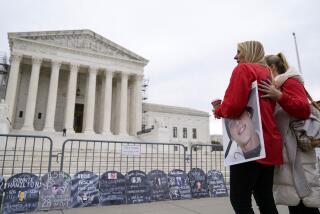$31-Million Settlement May Be in Works on Shiley Heart Valve
- Share via
IRVINE — Lawyers representing more than 300 recipients of potentially defective Shiley heart valves are negotiating a $31-million settlement with the manufacturer of the device, according to documents obtained by The Times this week.
Most of the clients, represented by attorney Bruce Finzen of the Minneapolis law firm of Robins, Kaplan, Miller & Ciresi, had sued Pfizer Inc. in New York and its subsidiary, Shiley Inc. in Irvine, saying they live in fear that their valves will fracture. Most of the suits are pending in Orange County Superior Court.
The Shiley valves were sold between 1979 and 1986 and have been implanted in about 51,000 people worldwide. Of those, about 300 have died when struts in the valves came apart.
Earlier this year, Finzen’s clients opted not take part in a $215-million class-action settlement approved by a federal court in August. Opponents of the class-action settlement had argued that the compensation was unfair, given their anxiety about the safety of the valves.
According to an unsigned escrow agreement, Pfizer is to place $31 million plus interest in a Norwest Bank account of Finzen’s law firm by Tuesday. The money is to be released pending approval of the settlement by Pfizer’s board of directors and notice that claims against the company have been dropped, the agreement states.
Pfizer officials denied Friday that any consensus has been reached.
“The company has not entered into any agreement,” Pfizer said in a statement. “However, we have been negotiating with the Robins, Kaplan, Miller & Ciresi firm on all of their cases and claims, which include lawsuits filed in California state courts.”
“The goal of such settlement negotiation would be to put all of the Robbins, Kaplan claims behind the company,” Pfizer said. “As a matter of policy, we do not discuss ongoing negotiation or litigation.”
The company said that it is also negotiating with the law firm over an unspecified number of cases involving patients whose valves fractured.
Finzen, who represents 341 valve recipients, was not available for comment. But a source familiar with the case said that an agreement is “very close” to being completed and could be announced in Orange County Superior Court, where a hearing to discuss a pending trial has been scheduled for Oct. 26.
The settlement, the source said, classifies recipients according to whether they live in California, elsewhere in the United States or in other countries. Patients in each area are thought to have varying degrees of difficulty in pursuing their claims, according to the source, with California residents having the greatest likelihood of success. Recent state court rulings have made it tougher for out-of-state recipients to pursue their cases in the state.
The escrow agreement, which is confidential, also states that the settlement of claims “is not and shall not be construed as an admission of liability, responsibility or fault by Pfizer.”
It was unclear what effect such an agreement would have on the earlier class-action settlement, which a federal judge in Cincinnati approved on Aug. 19.
Two weeks after that settlement was approved, Philadelphia lawyer Gary Green filed an appeal, arguing that the terms were unfair and that not enough consideration was given to those who objected to the offer. The appeal is pending.
That settlement provides heart-valve recipients with a total of $90 million to $140 million for medical or psychological consultations in which their spouses may be included. That works out to about $2,500 to $4,000 each.
The settlement also designates $75 million for research on procedures to detect flawed valves. In addition, an independent panel will set up guidelines for determining whether surviving patients need operations to replace their heart valves. Shiley will pay for any needed operations.
Finally, it sets aside $300 million for patients whose heart valves may fracture in the future. The amount ranges from $500,000 to $2 million for each recipient or family, depending on such factors as the age and the overall health of the patient. That money is not considered part of the total now available.
For six years, Green had been seeking a separate class-action settlement that would have covered about 2,500 Pennsylvania recipients.
“We thought it was a miscarriage of justice,” Green said of the Aug. 19 agreement. “There was no way of knowing what the settlement meant.”
More to Read
Inside the business of entertainment
The Wide Shot brings you news, analysis and insights on everything from streaming wars to production — and what it all means for the future.
You may occasionally receive promotional content from the Los Angeles Times.










